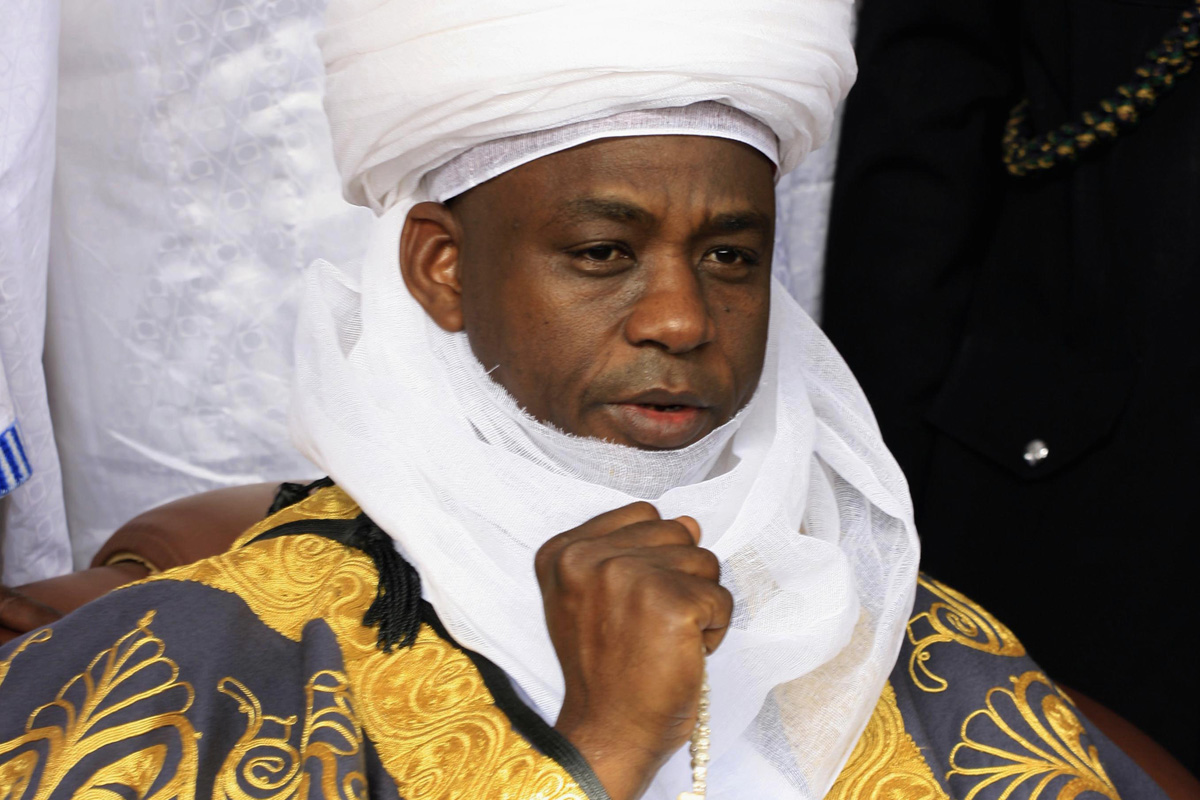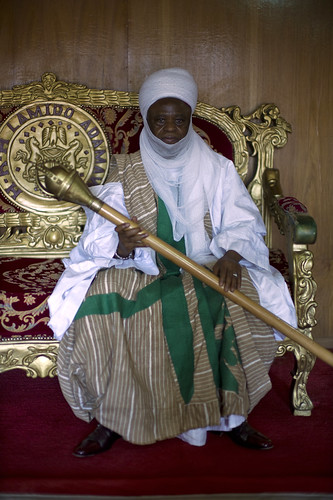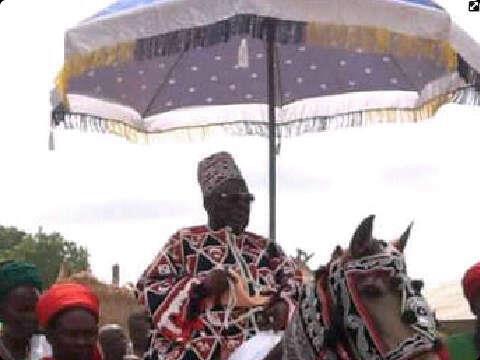SULTAN

There is no doubt to the established reality that, the Sultan of Sokoto remains the head of Nigerian Muslim faithful. However, not very many people can conveniently explain why the reverend traditional ruler doubles as the religious leader as well.
Sultan, an Arabic word, simply means Ruler or King. However, Sultan from the Arabic perspective, is not just a ruler but divinely ordained to lead the Muslims as Commander of the Faithful. Which, therefore, explains why, Sultans are said to be rulers over an independent government or state (Caliphate).
In Nigeria, the origin of Sultan predated the Colonial era, hence it is directly linked to the Sokoto Caliphate, which was, an independent Islamic Caliphate in West Africa founded during the Usman Dan Fodiyo Jihad War of 1809.
After stretching his grip beyond the then Hausa Kingdoms, to other parts of the Northern states, Usman Dan Fodiyo, (The Jihadists) extended his quest for refined Islam to the Western axis of Nigeria thereby linking over 30 Emirates and 10 million people to the Sokoto Caliphate.
With that tireless effort, the Sokoto Caliphate became the most powerful state in its region and one of the most significant empires in Africa in the nineteenth century.
Though, after the British incursion and subsequent conquest of the Caliphate in 1903, they abolished the political authority of the Caliph, but was left with no option than to allow the already established traditional institution whose administrative pattern was considered convenient for the Colonial masters to operate their system of indirect rule in that part of the captured territory.
The Colonial masters equally allowed the Sultan’s title to be retained. Hence, it was found to be in conformity with Islamic religion. Resultantly, the position of the Sultan was retained and remains an important religious position for Muslims in Nigeria till date.
Hierarchically, the Sultan is followed by the five Sultanate Councilors; namely, the Wazirin Gari, Magajin Gari, Magajin Rafi, Turaki and the Sarkin Malamai. The Council of Chiefs, which consists of Councilors and some senior District Heads, follows the Sultanate Councilors. The King Makers Council is responsible for the election of a new Sultan should the seat becomes vacant.
After the Sultan and his Councilors, the next most important traditional institution, which allows for good leadership, reinstatement of order and justice, assistance to the needy and preserving their culture and heritage as well as close check with respect to directive on religious matters is the Village Heads, (Maiangwa, Hakimi) among others.
Since the emergence of the Sokoto Calpihate, it had so far had 20 Sultans.The Sultan, though, mortal, however, commands great respect because every word that proceeds from his mouth is considered sacred.
Little wonder therefore, that, the Sultan Sa’ad Abubakar 111 is aptly defined by many as simply an epitome of humility and an apostle of peace not only in Nigeria, Africa but globally.
EMIR

An emir is the traditional and spiritual leader of his domain and he is supported by other traditional rulers or title holders, all of whom are appointed by him and hence, pay allegiance to his leadership.
Indeed, the emir has enormous influence and authority both of which were understandably, derived from their historical antecedent as custodians of the people’s culture, norms, values and traditions. Etymologically speaking, the word Emir derives its roots from the Arabic word AMIR, which is loosely translated to mean leader. It gained currency in emirate councils in Hausa states across the country, after the famous Jihad.
Before the Jihad which led to the subsequent introduction of the Sokoto caliphate, Katsina was under Habe Leadership and the ruler then was refered to as King of Katsina. Gradually, Islam became rooted in both Katsina and Daura consequent upon which the concept of Emir (Amir, implying leader of the faithful), gained prominence. History has it that the sarkin is a sovereign monarch limited only by traditions and conventions.
One thing which continues to remain certain is that the emir is both the spiritual and traditional leader of the people who command high respect among his subjects.
Prior to the advent of islam, it was gathered that different practices were adopted in the appointment of new rulers.
In Daura for example, only female were appointed as rulers while in Katsina, wrestling was said to be yardstick and whoever could slaughter the reigning king in a wrestling contest could succeed him.
However, all these have changed as the current practice is such that unlike in the past, Daura is being ruled by a male emir and the succession to the throne is made by Kingmakers who would make a choice by simple majority and the state governor then approves. This is also the case in other northern states such as Gombe, Bauchi, Damaturu, Kebbi, Katsina, Zamfara, Zaria, Ilorin, and Lafiya.
LAMIDO Of Adamawa

The traditional title of Lamido Adamawa was derived after a lieutenant of Shehu Usman Danfodio, Modibbo Adama conquered the vast area called Fombina Kingdom which consists of areas in the current Adamawa and Taraba states of Nigeria, the three northern provinces of Cameroon and some parts of Western Chad and the Central African Republic.
Modibo Adama, who was the brain behind the Fulani conquest that culminated in establishment of the kingdom, began the Jihad (Islamic Conquest) in 1809
The Lamido of Adamawa is the administrative and spiritual leader of the vast kingdom established by Modibbo Adama.
The Fombina Emirate as the kingdom like all other emirates under the dynasty of Sheik Usman Danfodio operates under strict Islamic codes with the Lamido as the spiritual and administrative head.
For convenience of administration, the kingdom was divided into districts, villages and wards with entrench leadership structure and control at each of the levels.
The district, ward and the village heads also serve as the spiritual and administrative leaders in their constituencies who are completely subservient to the Lamido of Adamawa.
The traditional title of Lamido of Adamawa is hereditary, which means only the progenies of the Lamido of Adamawa could ascend the throne.
It consist of kingmakers who are reposed with the responsibilities of choosing a new Lamido of Adamawa which is chosen from among the 4 ruling classes of the of the kingdom upon the demise of any Lamido.
Foremost among the kingmakers are Waziri of Adamawa, Ardo Zumo, Ardo Mayo Farrang, Uban Doman Adamawa, Galadiman Adamawa and Ardo Malabu.
Also to help in administering the the kingdom, the Lamido has lieutenants and councillors including the Sarkin Tsafta, Sarkin Zana, Sarkin Baka, Sarkin Bariki, Sarkin Dawaki Sarkin Dawaki, Sarkin Dogarai, Ajiya, and Sarkin Hurumi among many other councillors.
ETSU Nupe

“Etsu” is used to refer to the foremost king as traditional appellation proceeding the tribal name among the Nupe, and some Gbagi communities in the middle-belt region of Northern Nigeria.
The Nupe, traditionally called the Tapa by the neighbouring Yoruba, an ethnic group in central Nigeria, and are the dominant group in Niger State and an important minority in Kwara State.
Many Nupe were converted to Islam at the end of the eighteenth century by Mallam Dendo, a wandering preacher, and were incorporated into the Fulani Empire established by the Jihad led by Usman dan Fodio after 1806.
However, the traditions of Nupe were retained, hence the ruler of Nupe is the Etsu Nupe rather than being called Emir. The city of Bida fell to the colonialist British forces in 1897, the Etsu Abubakar was deposed and replaced by the more pliable Muhammadu (Vandeleur 1898).
The kingdom has since been replaced by the the Bida Emirate, a traditional state in its stead in the same middle-belt region, i.e. it is a successor to the old Nupe Kingdom, with its headquarters in Bida, Niger State. The head of the state is the Etsu Nupe, considered the leader of the Nupe people.
Coincidentally, and in what could attest to the universality of man, “Etsu” is a name in Japan in the far east which means “delight”.
MAI
The ‘Mai’ title which means (King) in the Kanuri parlance of Borno and Yobe states is still being used by some ranked monarchs in the two states. The Emir of Pataskum is still addressed as Mai, so is the Emir of Ngazargamu, both in Yobe state. The Mai title was used during the reign of the Saifawa Dynasty. Till date even some of the monarchs who use the title Shehu are still occasionally referred to as Mais by the locals.
In the late 18th century,Al-Hajj Muhammad al-Amîn ibn Muhammad al-Kânemî (1776–1837) a revered Islamic scholar, teacher, religious and political leader who took over power and ended the Sayfawa dynasty. Being a religious scholar Elkanemi chose to use the title Sheikh (Islamic Professor) in place of the title Mai (which means King in the Kanuri parlance). Since then, the monarchial household name changed to Kanem-Bornu Empire, ending the 800 year rule of the Saifawa Dynasty. Since then, the tile Shehu remained in force till date. Today, there are three Shehus in Borno; the Shehu of Borno, Dikwa and Bama.
Tor Tiv

Tor means “king’ in the language of the Tiv people of Benue State, North Central Nigeria. Hence the paramount traditional rural of all the Tiv communities that constitute the Tordom is referred to as the Tor Tiv.
HAmma Bachama
The chieftaincy (homne) in Bachama society is the highest decision making body both in the political and religious institutions as well as in the land tenure system.
Moreover, the chief (homun) presides over the cults and gifts to the gods must emanate from him. The four agents of political control in Bachama society are Zomye (royal clans), Kabe (non-royal clans), Homun (King), and the administrative council of elders in Lamurde and the outlying villages.
AKU UKA

Aku Uka is the title of the paramount traditional leader of the Jukun people in the Wukari Federation, a traditional state in Nigeria, a successor to the Kwararafa state of the Jukun people. The state is based in the town of Wukari in Taraba State, in the south of the Benue River basin. In other words, the foremost leader of the Jukun people in Wukari federation takes the title “Aku Uka”. It is followed by the leader’s name.
The Aku Uka of Wukari became the regional power in the 1840s after the once-powerful Kwararafa state had been destroyed during the Fulani jihad (1804–1810) and its aftermath. The consolidation of Wukari as an independent state may have been given impetus by pressure from the Chamba people, who were pushing westward down the Benue at that time.
GBONG GWOM Jos

Gbong Gwom means Baban Sarki (Big Chief) and also serves Chairman, Plateau State Council of Traditional Rulers.
The Berom are said to belong to the Bantu race. The Bantu race has a migratory pattern from South-West Africa, which is the present Namibia and extended to cover areas which include Namibia itself, the two Congos, South-Western Tanzania, Central African Republic, Gabon, Southern Cameroon, South Eastern Nigeria, Central Nigeria-covering Benue, part of Taraba, part of Nassarawa, Southern Kaduna, Southern Bauchi and Plateau States.
He is the paramount ruler of Berom nation which are predominantly found in Jos North, Barkin Ladi, Riyom, Jos South and Jos East local government of the Plateau State.
OCHE Idoma

Oche is the title borne by the paramount traditional rural of the Idoma people on the southern end of Benue State of Nigeria whose Language is Idoma. It means ‘King’ in the language and is used before the tribal name-Idoma and called Och’Idoma. The Och’Idoma’s throne is in Otukpo, the most popular town in Idoma land.
The Idoma are an ethno-linguistic group that primarily inhabit lower in the western areas of Benue State, Nigeria, and kindred groups can be found in Cross Rivers State and Nasarawa State in Nigeria. The Idoma language is classified in the Akweya subgroup of the Idomoid languages of the Volta–Niger family. The Akweya subgroup is closely related to the Yatye-Akpa sub-group. The bulk of the territory is inland, south of river Benue, some seventy-two kilometers east of its confluence with river Niger. The Idoma are known to be warriors’ and ‘hunters of class, but hospitable and peace-loving. The greater part of Idomaland remained largely unknown to the West until the 1920s, leaving much of the colorful traditional culture of the Idoma intact.
The Idoma may live in compact villages or in relatively dispersed family homesteads. Political ties exist primarily on the community level with a headman, or chief, who inherits his position along patrilineal lines.
GANGWARI GANYE
The Chamba are said to have, over 100 years ago, migrated from the East, from somewhere called Sham in present-day Syria, Asia. Therefore, it has been claimed linguistically that the name Chamba is derived from the name Sham. The Chamba are said to have travelled over long distances, sometimes fighting fierce battles along the way, before arriving at their present settlements which can be found in Adamawa and Taraba states in Nigeria and in the Republic of Cameroun. However, the headquarters of the Chamba is Ganye, a local government area in Adamawa State. This is where the seat of the paramount-cum-traditional ruler of the Chamba, Gangwari Ganye (big king of the Ganye) is situated. Ganye is both the administrative and traditional headquarters of the Chamba.
Presently in Nigeria, there are two Chamba traditional rulers. These are the Gangwari Ganye in Adamawa State and the Gara Donga in Taraba State.
MURUM MBULA
The Murum Mbula is the Paramount Ruler of the Mbula people. The name Murum originates from the Mbula word “Mur” which simply translate as “Head’. This means the Murum is the head of all Mbula people. The Mbula people are found in Demsa Local Government Area of Adamawa state and around other Local Government Areas in the State. They are predominantly farmers, fishermen and hunters who live along the Benue valley with a some living on and around the Gwamba and Tambo mountains. Those around the mountains are mostly hunters which is also the reason why the Mbula people unarguably rear more horses than any other ethnic group in the entire North-East sub-Region.
The people around the Benue Valley are mostly fishermen apart from being farmers. These explain their constant struggle with hippopotamus in the course of their fishing business. The Mbula people are known to be great hunters of the hippo even on the high waters where the animal is stronger and in its best elements. Every reigning Murum takes up a title for himself from the time he ascends the throne of his ancestors. The title and symbol signifies his heroism and focus for the people.
The current reining Murum is known as Murum J.J. Fwa ‘Ngya Nduriya’ which means the Mother Hippo and by extension, the indomitable Hippo of the Benue Valley. The Hippo symbol represents strength, courage and heroism for the Mbula Nation and their Murum is the complete embodiment of all that.
No comments:
Post a Comment